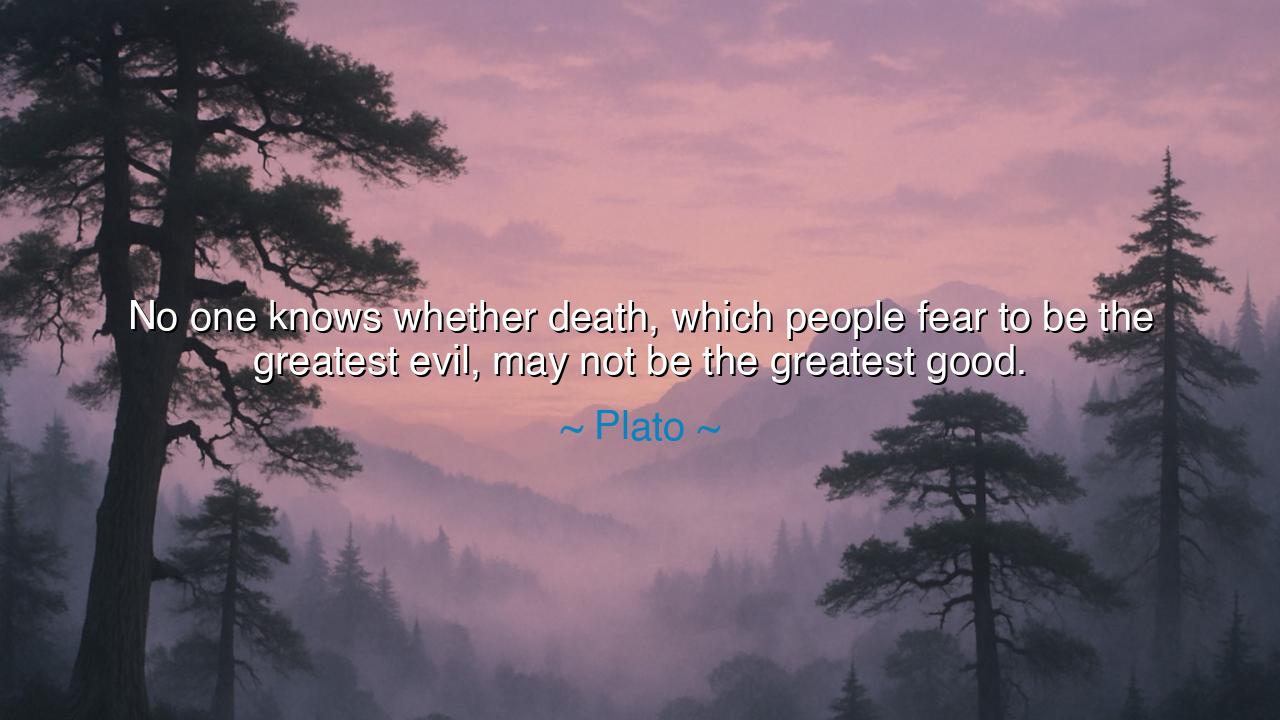
No one knows whether death, which people fear to be the greatest
No one knows whether death, which people fear to be the greatest evil, may not be the greatest good.






When Plato wrote, “No one knows whether death, which people fear to be the greatest evil, may not be the greatest good,” he was giving voice to the mystery that lies at the heart of existence — the boundary no mortal can cross and return unchanged. In these words, he invites us to turn our gaze from fear to wonder, from dread to wisdom. For death, that dark and silent threshold, may not be the curse we imagine, but the crown of life — a transformation rather than an end. Spoken in his dialogue Apology, these words came through the lips of Socrates, who faced his own execution with serenity. They are not a denial of death’s sorrow, but a challenge to the tyranny of fear that blinds the soul to what might lie beyond.
Socrates had been condemned by Athens for corrupting the youth and questioning the gods, yet even in chains he stood fearless. To his judges, he said that no man truly knows what death is — that it might be a dreamless sleep or a passage into another realm where souls meet truth face to face. Thus, he reasoned, why should one fear what one cannot know? His calm acceptance, born of reason and faith, astonished his accusers. While others saw death as defeat, Socrates saw it as a mystery — perhaps even a blessing. In this spirit, Plato preserves for all generations the wisdom that fear of the unknown is the first chain that binds the human heart.
In the ancient world, where gods walked the imagination of men, death was seen both as terror and as doorway. The Egyptians embalmed their dead in hope of eternity; the Greeks told of the shadowy fields of Hades; the Hindus spoke of rebirth and karma’s wheel. Each vision sought to answer the same question: what lies beyond? Plato, through Socrates, dared to say — we do not know. And in that unknowing lies both humility and courage. To confess ignorance of death is not despair; it is the highest act of reverence for life’s mystery. It frees us from superstition and awakens in us a quiet awe.
There are echoes of this truth in every age. Consider the story of Joan of Arc, the peasant girl who faced the flames for her faith. As the fire was lit, she did not weep or curse. “Do not fear,” she said, “for I shall be with God soon.” To those who watched, her death seemed cruel; yet in her peace they saw a glimpse of something greater — a good beyond the grasp of pain. Like Socrates, Joan transformed death from a punishment into a passage. The body perished, but the spirit triumphed. So too does Plato remind us: what seems an evil to the eyes of flesh may, to the soul, be a hidden blessing.
The meaning of this quote, then, is not merely philosophical but deeply human. It calls us to see that our terror of death often springs from our clinging to life’s illusions — our possessions, our power, our pride. We call death evil because it takes away what is temporary. But Plato suggests that if there is something eternal within us — the soul, the mind that seeks truth and goodness — then death may be its release, its homecoming. The great error of man is to judge with limited sight. What appears as night may, in truth, be the dawn of another light.
Yet this teaching is not a call to hasten death or to despise life. Plato’s wisdom is balance — to live fully, yet not to be enslaved by fear of losing what cannot last. When one accepts the uncertainty of death, life itself becomes richer. Each moment shines brighter when we know it may be our last, and every act of kindness gains meaning when we realize it might be our legacy. The fearless heart, like that of Socrates, lives with open hands — ready to give, ready to let go, ready to step into the unknown with grace.
So, my child, take this lesson and hold it close: do not flee from death in terror, nor chase it in despair. Rather, walk toward it as you walk toward the horizon — knowing that though the sun sets, it rises again beyond your sight. Practice gratitude for each breath, and let courage dwell where fear once lived. Seek truth, as Socrates did, until your final hour. For in the end, death may not be the greatest evil, but the greatest good — the doorway through which the soul, freed of all illusion, at last comes home to the eternal.






AAdministratorAdministrator
Welcome, honored guests. Please leave a comment, we will respond soon